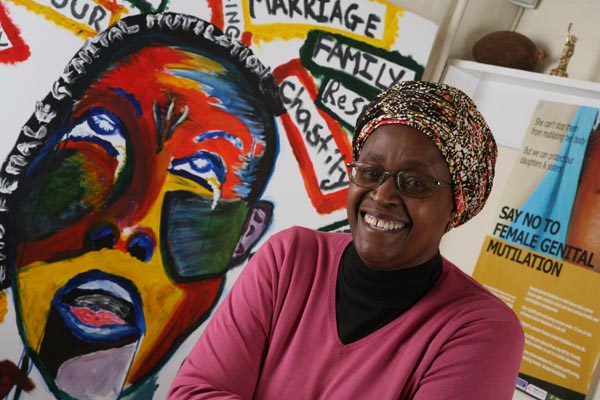Reflecting on 40 years of FORWARD with Naana Otoo-Oyortey
In honour of our 40th anniversary (30th August 2025), I am truly delighted to reflect on my earliest memories of FORWARD (Foundation for Women’s Health, Research and Development) and the Seeds of Change that have shaped our journey.
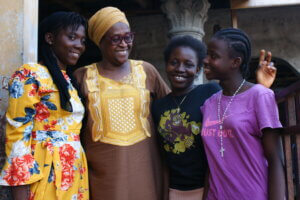
- Over four decades, Female Genital Mutilation (FGM) has remained a central part of our work, and while we have made great strides, we continue to also focus on the broader spectrum of violence faced by African women and girls.
- From influencing international agendas to driving government advocacy, we have remained steadfast in our commitment to centering women’s rights, while thinking collectively and courageously to advance the global movement to end violence against women and girls. – Naana Otoo-Oyortey MBE, Executive Director
What did campaigning on Female Genital Mutilation (FGM) look like in the 1980s/1990s?
Looking back on FORWARD’s earliest years, campaigning on FGM in the 1980s and 1990s was a very different landscape, marked by limited technology, cultural stigma, backlash from affected communities and the absence of political will. In this environment, our Founder, Efua Dorkenoo OBE, fondly known as Mama Africa, planted the first seeds of awareness.
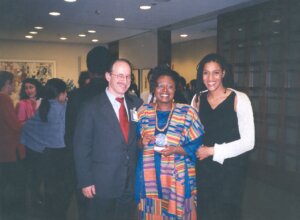
Working alongside Lord Kennet, she helped secure the Female Circumcision Act 1985, the UK’s first legislation on FGM. Though imperfect, this was a turning point: FGM was finally recognised as a human rights violation that demanded urgent action in the UK.
“A friend of a friend of mine underwent FGM in London. I was surprised to find out how many women and girls are affected by it in London alone. It is an issue that needs to be addressed.” — Skin, former Patron of FORWARD and lead singer of Skunk Anansie
Efua’s strategic vision extended well beyond FORWARD and the UK. She influenced policy debates across Europe and Africa and, as Special Adviser to the World Health Organisation, was pivotal in securing the first World Health Assembly resolution on harmful traditional practices. From 1995 to 2001, she was seconded to WHO, where she supported countries in developing national policies, strategies, and tools to address FGM.
How did you become involved with FORWARD?
Efua reached out to me when she was working with WHO to join FORWARD in 2000. This was a call I gladly accepted and got hooked. Adwoa Kwateng-kluvitse the former Director of FORWARD taught me the ropes of FGM training and advocacy when I joined as a board member, long before I became the Executive Director. Adwoa, my soul sister, had been part of FORWARD since its early days, wearing many hats and now, in retirement, co-founding TuWezeshe Global in Ghana to nurture the next generation of young women leaders. I remember vividly our journeys to small towns outside London, speaking in village halls late into the night, as well as our international advocacy that helped place child marriage on the development agenda.
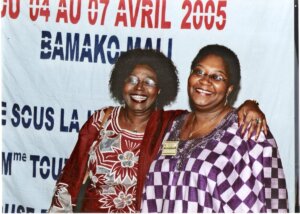
We all have our stories on how we joined FORWARD, Adwoa recalls her work with Efua:
“I think I met Efua at the Women’s Centre, 4 Wild Court. We got on well right from the start, I believe it was in1984. I feel like I have been with FORWARD forever! If one is committed to the issues, I think one can never leave. I remember that while I was still working for the local authority, we organised the first local authority workshop on FGM on 6th September 1986. I could not attend, as I was in hospital that day having my second daughter.”
Michael, a long-term FORWARD volunteer recalls how he became involved with our work and has maintained this connection till today, providing technical support and guidance and giving generously to our work. He attended a supporter meeting at Africa Centre and met Efua. In his first fundraising experience he notes that:
“In those days there was no JustGiving; you just had to hassle friends and family with paper forms, and you were expected to complete the challenge before getting the money. I think it raised a few hundred. Bizarrely, it resulted in me being indexed in Efua’s book Cutting the Rose, next to others whose achievements were far more significant than someone doing a fun run.”
As FORWARD celebrate 40 years, what role does intergenerational connections play in sustaining the movement to end FGM?
At FORWARD, intergenerational connections have always been central to sustaining the movement to end FGM and all forms of violence. One of FORWARD’s proudest legacies has been the intergenerational activism. This started with the Young People Speak Out initiative which helped usher in our innovative TuWezeshe Young Women’s Leadership Programme. Born from the collaboration of different generations and organisations, TuWezeshe has, over nearly 10 years, trained more than 450 young women in Africa and the UK. Its legacy is profound; the TuWezeshe Global Sisterhood continues to shape new ecosystems and possibilities for change for young women.
Angela Muruli was with us at the inception of TuWezeshe. Together we travelled to Tanzania and Uganda for training and project visits. Angela honed her leadership skills at FORWARD and has since gone on to found a peer mentoring network of African women in development, now supporting over 400 members.
As Angela reflects: “I would not have been able to do that if not for the leadership skills FORWARD gave me.”
Her journey is a testament to how investing in young women leaders multiplies impact across generations and spaces.
As we uphold our vision ‘We want to see African girls and women everywhere enjoy equality, live in dignity, be healthy, and thrive free from fear of violence’ what excites you about this new wave of activism?
As we uphold our vision I am deeply excited by the new wave of activism led by young women in our programmes.
Home Girls Unite has sparked a global movement on the challenges facing eldest daughters of migrant families in the UK and the US.
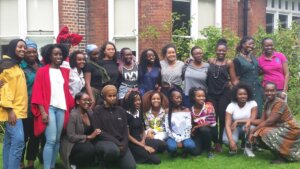
Today, Doreen in Tanzania set up Women of Influence and reached over 5000 women.
“Before joining Tuwezeshe, I knew I had leadership potential. I had great ideas written on paper, but I didn’t know how to bring them to life. Tuwezeshe gave me that direction. It changed my path, and I’m proud of it.”
They are bold, unapologetic, and harnessing digital platforms and creative tools in ways that were unimaginable when FORWARD began 40 years ago. What excites me most is the shift from silence to amplying voices and sisterhood building: young activists are telling their own stories, shaping narratives, and building global solidarity. They are unafraid to challenge cultural pressures, call out systemic inequalities, and design solutions rooted in their lived experiences. Their energy, creativity, and fearlessness give me great hope that the world we have long envisioned is not only possible, but within reach.

